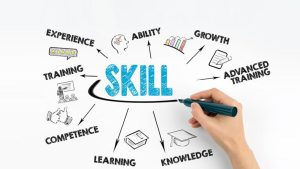

Menu
E-learning enablement through various modalities
- admin
- January 22, 2024
- 5:38 am
- No Comments

E-learning enablement through various modalities
Personalized Learning Paths:
- Implement a system that assesses each employee’s skills, strengths, and weaknesses to create personalized learning paths.
- Utilize adaptive learning technologies to dynamically adjust the difficulty and content of courses based on individual progress.
Gamified Learning Modules:
- Incorporate gamification elements to make learning more engaging and enjoyable.
- Introduce rewards, badges, and leaderboards to encourage healthy competition among employees.
Virtual Reality (VR) Training:
- Explore the use of virtual reality for hands-on training experiences, especially for tasks that require practical skills.
- VR can be particularly effective for training in fields like manufacturing, healthcare, or emergency response.
Microlearning Modules:
- Break down courses into bite-sized modules that can be easily consumed during short breaks.
- Microlearning allows employees to absorb information in smaller chunks, improving retention and accessibility.
Social Learning Platforms:
- Create a social learning platform where employees can share knowledge, discuss topics, and collaborate on projects.
- Encourage the formation of online communities of practice within the organization.
AI-Powered Tutoring:
- Implement chatbots or AI-powered tutors to provide instant support and clarification on course content.
- This can enhance the learning experience by offering personalized assistance 24/7.
Interactive Simulations:
- Develop realistic simulations that mimic workplace scenarios to allow employees to practice and apply their skills in a risk-free environment.
- Simulations can be particularly useful for complex or high-stakes situations.
Mobile Learning Apps:
- Create a mobile app to facilitate learning on-the-go, enabling employees to access courses from their smartphones or tablets.
- Mobile learning apps provide flexibility and convenience.
Continuous Learning Culture:
- Foster a culture of continuous learning by encouraging employees to set learning goals and providing resources to achieve them.
- Recognize and reward employees who actively engage in ongoing professional development.
Data Analytics for Learning Analytics:
- Implement data analytics tools to track and analyze employee learning progress.
- Use the insights gained to tailor future learning initiatives and identify areas where additional support may be needed.
Inclusive Content:
- Ensure that e-learning content is diverse and inclusive, catering to a broad audience.
- Include content that reflects different perspectives and experiences to create a more inclusive learning environment.
Peer Mentoring Programs:
- Establish peer mentoring programs where experienced employees mentor newer team members.
- This facilitates knowledge transfer and creates a sense of community within the organization.
Language Support:
- Provide multilingual support for e-learning content to cater to a diverse workforce.
- This ensures that language barriers do not hinder the learning experience.
Collaborative Projects:
- Integrate collaborative projects into the e-learning curriculum, allowing employees to apply their knowledge in real-world scenarios.
- Foster teamwork and creativity through group assignments.
Certification Programs:
- Develop certification programs that employees can complete to demonstrate their expertise in specific areas.
- Certifications can be tied to career advancement and recognition.
IND : tel:+91 22-68327037
1B-95, Phoenix Paragon Plaza, Kurla West, Mumbai – 400070
Infylearn resonates with infinite learning. We create cutting-edge learning solutions for our clients. Our consultative approach towards the work we do makes us the best service provider in the industry.


